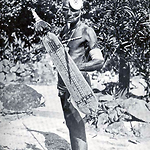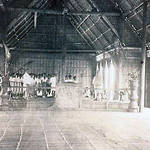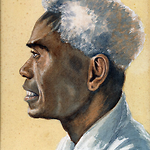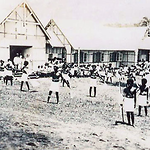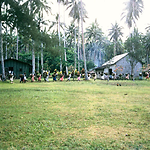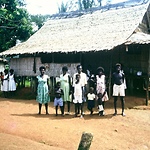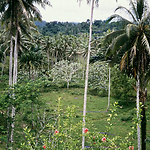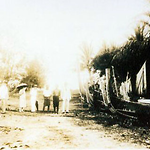Place: Choiseul Island
Details
Lauru, the local name for Choiseul, is the sixth largest island in the Solomons. A mountainous forest-clad island, 128 kilometres long and 32 across at its widest point, it lies between Bougainville and Isabel in the northeast of the Solomons and opposite the Shortland and Treasury Islands and Vella Lavella. There are two large contiguous islands in the south, Vaghena and Rob Roy, and many small islands off the southwest coast. The highest point on Choiseul is Mt. Maetambe reaching 1,066 metres near the island's centre. Other peaks in the central spine reach 459 to 600 metres. There is little flat land and the interior has many deep valleys.
In 1568, Spanish explorer Mendaña named the island San Marcos but did not land there, and in 1768 French explorer Louis de Bougainville named it Choiseul after Étienne François, Duc de Choiseul, the French Foreign Minister.
Choiseul has a variety of shell wealth items, some ancient with spiritual connections, and others more modern and closer to currencies (q.v.). Choiseulese had some, limited contact with whalers and traders from the early decades of the nineteenth century. During that century's second half Choiseul suffered deprivations and depopulation from attacks by New Georgia headhunters, led by Hingava, which forced many of the people to move inland to live on fortified ridges just above the coast. The low-lying area around Manning Straits and Vaghena Island in the south opposite New Georgia was largely uninhabited at the beginning of the twentieth century because it was difficult to defend them from the raiders. (Scheffler 1965a, 25) Between 1886 and 1899, Choiseul became part of German New Guinea, with little effort made to do more than mark trees and erect markers. Choiseulese had some access to firearms by the 1890s, probably traded from nearby New Georgia or Vella Lavella in return for 'slaves'. (Scheffler 1965a, 17) The headhunting expeditions were stopped after the British opened a base at nearby Gizo in 1899 and suppressed them by violent para-military coercion.
In 1902, the Methodists established a mission in Rendova Lagoon, New Georgia, which expanded to Choiseul in 1904-1905, despite objections from the Anglicans Melanesian Mission. Fijian and Samoan pastors were later replaced by European missionaries, although the Methodists employed Tongan teachers (ministers) into the 1960s. In 1909, the Anglicans tried to start a school on Choiseul, but then withdrew. Catholic Marists visited Choiseul in 1903 and established themselves at Tambatamba River in 1912; although the priest was soon invalided to Sydney, leaving the station to operate ineffectively from the Shortlands until 1920. Another failed attempt to establish a permanent Choiseul base was made between 1920 and 1925, after which the few Catholics on Choiseul were once more serviced from the Shortlands until a permanent presence was finally established in 1931. (Laracy 1976, 54-59) The Seventh-day Adventists arrived in 1922.
All of these early Europeans and Pacific pastors and teachers were drawn into existing exchange networks. The missions persuaded the Choiseulese to move to the coast so they would be easier to access. The groups contacted first, Babatana language speakers, moved first and took up the best coastal land. When more powerful clans from further inland arrived they found themselves blocked, which led to many land disputes during the first half of the twentieth century. (Allan 1989, pt. 1, 25; McDonald 2010)
Headhunting, and diseases introduced via traders and the labour trade caused depopulation during the final decades of the nineteenth century and the early decades of the twentieth. Few Choiseulese were involved in the overseas labour trade, presumably because the island was within German New Guinea from 1886 until 1899. Only fifty-eight contracts were issued to Choiseulese in Queensland, all between 1883 and 1887 (Price with Baker 1976); twenty-seven indenture agreements were signed for Fiji between 1876 and 1887 (Siegel 1985); and there were 768 indentured Choiseulese labourers within the Protectorate between 1913 and 1940. (Shlomowitz and Bedford 1988) Although geographically close to mainstream developments in the Western Solomons, Choiseul's smaller population was never fully exposed to the labour trade. The first District Officer was appointed to the island in 1925. Intertribal fighting incidents were reported until the mid-1930s.
The Methodist headquarters were at Sasamungga and the Catholics were based at Tambatamba. There were a few plantations on Choiseul: at Choiseul Bay and Tambatamba in the north, at Nananggo and Luti in the centre of the island, at Salakana on islands off the south end, and on Vaghena. (Bennett 1987, 134) Choiseul was administered from the Shortland Islands before the Second World War. During the war, the Japanese partly occupied Choiseul and established two bases in the north. When the British withdrew in late 1941 they advised the people to retreat inland, which many did. A significant number of Choiseulese worked with the coastwatchers and collaborated with the Americans who landed in October 1943. Three Choiseulese were decorated. (Scheffler 1965a, 29; Golden 1993, 404; Bennett 1987, 134)
There has been continuous movement of people from Choiseul to Vella Lavella and other islands in search of work. (Friesen 1986) Choiseul had several Local Councils until 1948 when the people were persuaded to amalgamate the island's seven sub-districts into a single Choiseul Council with its headquarters at Malanno (Malangono). (Allan 1989, pt. 1, 24; Scheffler 1965a, 32) Choiseul was placed within the Western District and after independence remained within Western Province, but it became a separate Lauru Province in 1992. Its administrative centre is on small Taro Island in Choiseul Bay on the northwest coast. (Scheffler 1963, 1965a; Bennett 1987, 350-355)
Choiseul was included in Richard Thurnwald's three-volume work (1912) on the Bismarck Archipelago and the Solomon Islands, and was visited by Austrian anthropologist Hugo A. Bernatzik in 1932, who took many photographs and collected customary stories and artefacts. His most important publication was Sudsee (South seas) (1934). Arthur Cappell summarised Choiseul social structure in the journal Oceania in 1943. He was followed in the 1950s by the American anthropologist Harold W. Scheffler, who conducted the first detailed ethnographic study on the island and published his findings in Choiseul Island Social Structure (1965a). Scheffler believed that in pre-contact time Choiseul had a population of around ten thousand people who lived in widely dispersed, small hamlets, although they came together for gift-exchanges and defence. In 1957, the population was 5,700. Five Choiseulese languages or dialects crosscut the island (Vagua, Varisi, Babatana, Sisingga and Kirunggela), and a smaller group speaks Ririo on the eastern border of Varisi and Babatana. All are more closely related to each other than to languages of nearby islands. (Scheffler 1963, 1965a, 1-38; Lynne McDonald, personal communication, 29 Sept. 2011)
Related entries
Published resources
Books
- Allan, Colin H., Solomons Safari, 1953-58 (Part I), Nag's Head Press, Christchurch, 1989. Details
- Bennett, Judith A., Wealth of the Solomons: A History of a Pacific Archipelago, 1800-1978, University of Hawai'i Press, Honolulu, 1987. Details
- Bernatzik, Hugo A., Sudee, Deutsche Buch-Gemeinschaft, Berlin, 1934. Details
- Golden, Graeme A., The Early European Settlers of the Solomon Islands, Graeme A. Golden, Melbourne, 1993. Details
- Laracy, Hugh M., Marists and Melanesians: A History of the Catholic Missions in the Solomon Islands, Australian National University Press, Canberra, 1976. Details
- Scheffler, Harold W., Choiseul Island Social Structure, University of California Press, Berkeley, Calif., 1965. Details
Journal Articles
- Scheffler, Harold W., 'Choiseul Island Descent Groups', Journal of the Polynesian Society, vol. 72, no. 3, 1963, pp. 177-187. Details
- Shlomowitz, Ralph, and Bedford, Richard D., 'The Internal Labour Trade in New Hebrides and Solomon Islands, c 1900-1941', Journal de la Société des Océanistes, vol. 86, 1988, pp. 61-85. Details
- Siegel, Jeff, 'Origins of Pacific Island Labourers in Fiji', Journal of Pacific History, vol. 20, no. 2, 1985, pp. 42-54. Details
Theses
- Friesen, Ward W., 'Labour Mobility and Economic Transformation in Solomon Islands: Lusim Choiseul, Bae Kam Baek Moa?', PhD, University of Auckland, 1986. Details
- McDonald, Lynne, 'Choiseul and the Missionaries: The Methodist Mission on Choiseul, Solomon Islands, 1905-1941', MPhil, Massey University, 2010. Details
Images
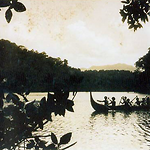
- Title
- A canoe at Sambe, Choiseul, 1920s, Rev. R.A. Nicholson Collection
- Type
- Image
- Date
- 1920s
- Source
- McDonald Collection
.png)
- Title
- A Canoe House, Pachu River, Choiseul Island
- Type
- Image
- Date
- 1906
- Source
- Anglican Church of Melanesia
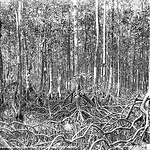
- Title
- A Mangrove Swamp, Pachu River, Choiseul Island
- Type
- Image
- Date
- 1906
- Source
- Anglican Church of Melanesia
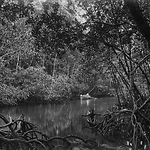
- Title
- A Peep at the Pachu River, Choiseul Island (Solomon Islands)
- Type
- Image
- Date
- 1906
- Source
- Anglican Church of Melanesia
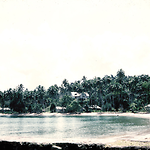
- Title
- Across the bay looking at the Choiseul Methodist Mission Station
- Type
- Image
- Date
- 1950s
- Source
- McDonald Collection
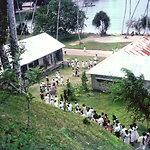
- Title
- After Sunday Service, Sasamungga, Choiseul Island
- Type
- Image
- Date
- 1950s
- Source
- McDonald Collection
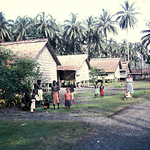
- Title
- Alice, wife of Rev. McDonald and their children David and Barry at Sasamungga, Choiseul
- Type
- Image
- Date
- c. 1961 - 1962
- Source
- McDonald Collection
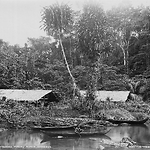
- Title
- Canoe Houses, Pachu River, Choiseul Island
- Type
- Image
- Date
- 1906
- Source
- Anglican Church of Melanesia

- Title
- Canoe Houses, Pachu River, Choiseul Island (Solomon Islands)
- Type
- Image
- Date
- 1906
- Source
- Anglican Church of Melanesia
.png)
- Title
- Canoe Houses, Pachu River, Choiseul Island (Solomon Islands)
- Type
- Image
- Date
- 1906
- Source
- Anglican Church of Melanesia
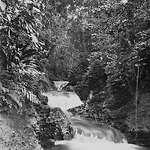
- Title
- Cascades on Pachu River, Choiseul Island (Solomon Islands)
- Type
- Image
- Date
- 1906
- Source
- Anglican Church of Melanesia
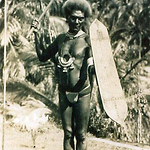
- Title
- Chief, Choiseul Island, Rev. R.C. Nicholson Collection
- Type
- Image
- Date
- 1920s
- Source
- McDonald Collection
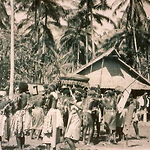
- Title
- Choiseul feast at Sasamingga for the Jubilee of the coming of the Methodist Church to Choiseul
- Type
- Image
- Source
- McDonald Collection
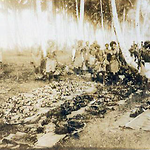
- Title
- Choiseul food distribution, Senga Paqoe Rev R.C. Nicholson Collection
- Type
- Image
- Date
- 1920s
- Source
- McDoland Collection
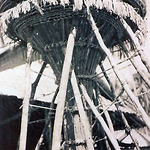
- Title
- Choiseul nut storage towers, Rev. R.C. Nicholson Collection
- Type
- Image
- Date
- 1920s
- Source
- McDonald Collection
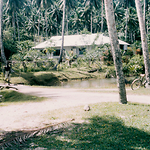
- Title
- Choiseul Tarava Creek and the Methodist Mission house, 1958-1959
- Type
- Image
- Date
- 1958 - 1959
- Source
- McDonald Collection
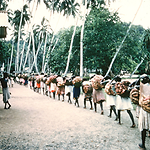
- Title
- Choiseul women carrying food for the Methodist 50th year celebration, 1950s
- Type
- Image
- Date
- 1950s
- Source
- McDonald Collection
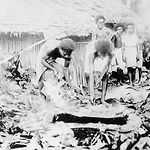
- Title
- Choiseul, lifting a feast from an underground oven at Senga
- Type
- Image
- Date
- 1920s
- Source
- McDonald Collection
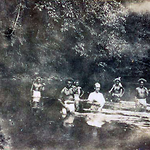
- Title
- Either Rev Goldie or Rev Nicholson on Choiseul crossing a river, 1920s, Rev. R.A. Nicholson Collection
- Type
- Image
- Date
- 1920s
- Source
- McDonald Collection
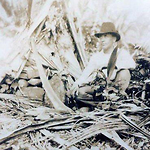
- Title
- Either Rev Goldie or Rev Nicholson on Choiseul, 1920s, Rev. R.A. Nicholson Collection
- Type
- Image
- Date
- 1920s
- Source
- McDonald Collection
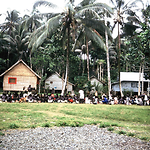
- Title
- Feast to open village store and Sasamungga, Choiseul Island
- Type
- Image
- Date
- 1950s
- Source
- McDonald Collection
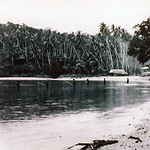
- Title
- Fishing with nets at Sasamungga, Choiseul, 1920s, Rev. R.A. Nicholson Collection
- Type
- Image
- Date
- 1920s
- Source
- McDonald Collection
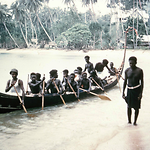
- Title
- Jobi Rotoava and the Tomoka canoe built for the visit of the Duke of Edinburgh to Gizo in 1958
- Type
- Image
- Date
- 1958s
- Source
- McDonald Collection
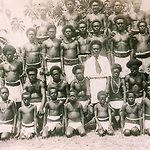
- Title
- Malangono, Choiseul group photo, Rev. R.C. Nicholson Collection
- Type
- Image
- Date
- 1920s
- Source
- McDonald Collection
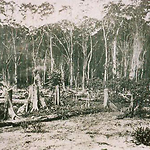
- Title
- Mbambatana Mission Station on Choiseul from the back verandah of the mission house
- Type
- Image
- Date
- 1920s
- Source
- McDonald Collection
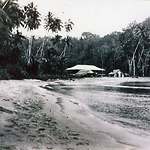
- Title
- Mission house at Sasamungga Bay, Choiseul, 1920s, Rev. R.A. Nicholson Collection
- Type
- Image
- Date
- 1920s
- Source
- McDonald Collection
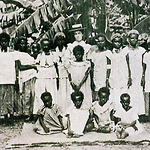
- Title
- Mrs Rooney and women from the Methodist congregation on Choiseul, 1920s
- Type
- Image
- Date
- 1920s
- Source
- McDonald Collection
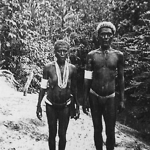
- Title
- Navala and his wife at Sepa, Choiseul, 1920s, Rev. R.A. Nicholson Collection
- Type
- Image
- Date
- 1920s
- Source
- McDonald Collection
.png)
- Title
- On the Pachu River, Choiseul Island (Solomon Islands)
- Type
- Image
- Date
- 1906
- Source
- Anglican Church of Melanesia
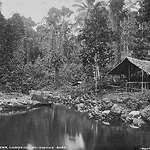
- Title
- Pachu River, Choiseul Island (Solomon Islands)
- Type
- Image
- Date
- 1906
- Source
- Anglican Church of Melanesia

- Title
- The Cascades, Pachu River, Choiseul Island
- Type
- Image
- Date
- 1906
- Source
- Anglican Church of Melanesia

- Title
- The Pachu River from the Cascades, Choiseul Island
- Type
- Image
- Date
- 1906
- Source
- Anglican Church of Melanesia
.png)
- Title
- Three children adopted by Sister Ethel McMillan, Choiseul, 1920s, Rev. R.A. Nicholson Collection
- Type
- Image
- Date
- 1920s
- Source
- McDonald Collection
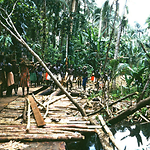
- Title
- Villagers building a bridge at Sasamungga village using scrap Second World iron as the decking
- Type
- Image
- Date
- 1960s
- Source
- McDonald Collection
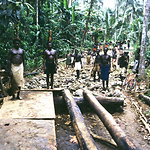
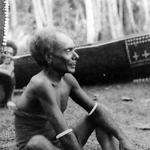
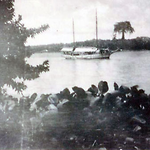
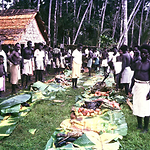
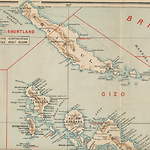
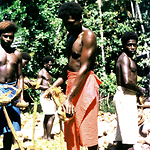
.png)
